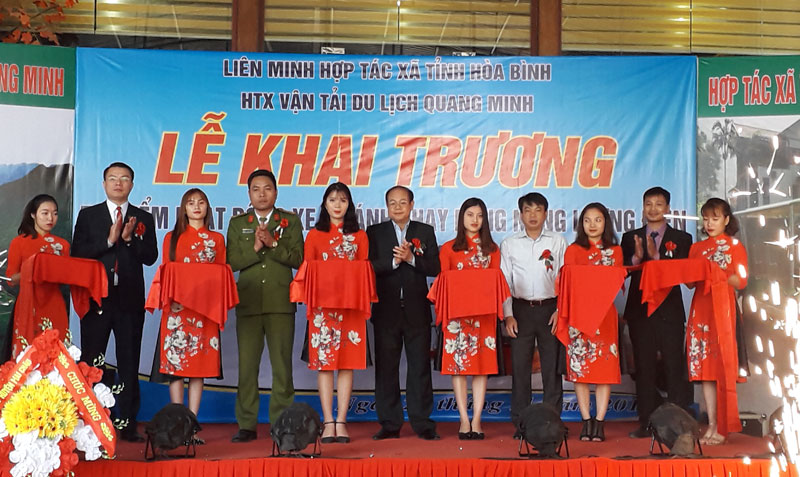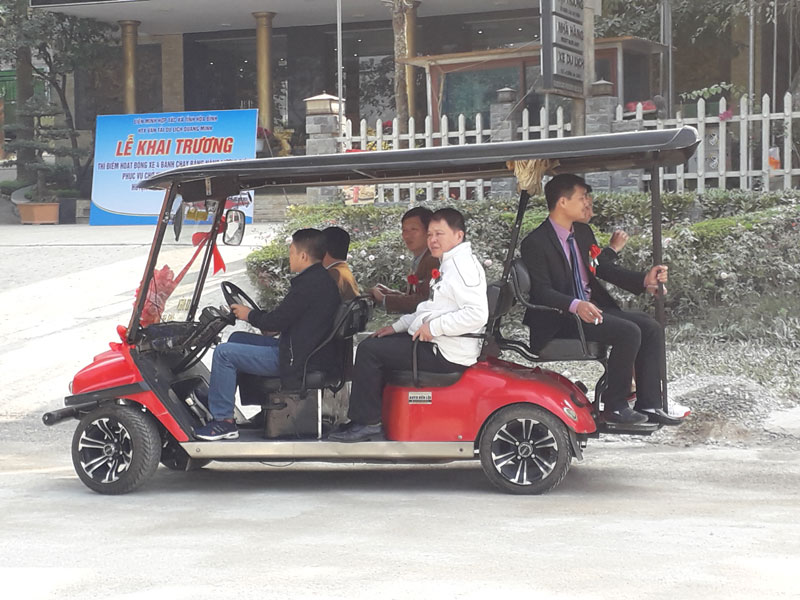
(HBO) - In collaboration with the provincial Cooperatives, Quang Minh Cooperative of Tourism Transport has launched a pilot operation of 4 wheel electric vehicles to transport tourists to visit Mai Chau district. There were Mr. Nguyen Quang Thang, the Vice Chairman of the District People's Committee and representatives of some related departments attending the ceremony.
With the advantage of famous cultural and
ecological tourism and craft village, in the recent years, Mai Chau has always
been an attractive tourist destination for domestic and international tourists
to visit and relax. In 2018, Mai Chau district has welcomed over 332,000
visitors, including 132,500 international visitors and nearly 200,000 domestic
visitors, the total revenue of tourism is estimated at over 107.6 billion VND.
The development of tourism has also brought many shortcomings, especially many
homestays and individuals have massively bought 4 wheel electric vehicles
without registration for passenger transport, at a time in the district there
are over 100 passenger cars. Due to that fact, on November 26th, Mai
Chau district officially decided to set up Quang Minh Cooperative with 7
members obtaining electric cars to serve tourists traveling in short distances
to the tourist destinations in Chieng Chau commune and Mai Chau town.

The leaders of Mai Chau district and related
departments cut off the opening band of the electric car service.
To congratulate Quang Minh Cooperative of
Tourism and Transport, Mr. Nguyen Quang Thang, the Vice Chairman of the
District People's Committee, requested the participating units to fully comply
with the provisions of the law on land road traffic; vehicles must be
registered, registry and meet all technical safety conditions, the driver must
also have a driving license as prescribed. They must not conflicts for
passengers, the fare will be collected as prescribed and they must absolutely
ensure traffic safety and environmental sanitation. Relevant agencies and units
need to be facilitated and identify stopovers, picking up and parking lots to
ensure the interests of cooperatives operating in accordance with current
regulations.

The delegates are experiencing the service of
4-wheel drive of Quang Minh Cooperative of Tourism and Transport.
This is a clean, fuel-efficient,
environmentally friendly transport vehicle. The operation of 4 wheel
electric-powered cars is currently of great interest to many local people. It
not only reduces environmental pollution, builds a civilized and modern tourism
image but also creates jobs for the local people. Moreover, it contributes to
overcoming the chaos in the management of electric cars today.
Located just a 20-minute drive from Hoa Binh City, Ora Hill Farmstay & Glamping Hoa Binh is a captivating new destination nestled in Mo hamlet, Bình Thanh commune, Cao Phong district. Combining farming with leisure, this tranquil retreat is perfect for those seeking balance, joy, and an immersive experience in the expansive beauty of nature.
Muong Bi - Tan Lac is renowned as one of the four famous Muong regions in Hoa Binh province. Blessed by nature with a favourable climate and stunning landscapes, Tan Lac holds great advantages for tourism development. The local tourism industry has made remarkable strides in recent times thanks to the attention and support from the local authorities and sectors.
With its strategic location, well-developed transport network, and diverse soil and climatic conditions, Hoa Binh is emerging as a must-visit destination in Vietnam's northwestern tourism corridor. The province boasts numerous attractions, including the Kim Boi hot springs (Kim Boi district), the Dau Rong cave complex (Cao Phong), the Mai Chau valley (Mai Chau), and the iconic Hoa Binh hydropower plant.
The northern mountainous province of Hoa Binh has been listed among the 71 most beautiful places to visit worldwide by the prestigious US travel magazine Condé Nast Traveller.
Hoa Binh province’s rich natural and cultural resources position it as a prime location for developing community-based tourism (CBT). In recent years, support from central and provincial policies, as well as assistance from non-governmental organisations, have encouraged local ethnic minority and mountainous communities to actively engage in the sector.




